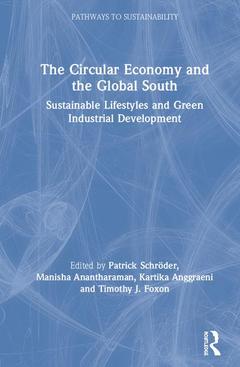The Circular Economy and the Global South Sustainable Lifestyles and Green Industrial Development Pathways to Sustainability Series
Coordonnateurs : Schröder Patrick, Anantharaman Manisha, Anggraeni Kartika, Foxon Timothy J.

The circular economy is a policy approach and business strategy that aims to improve resource productivity, promote sustainable consumption and production and reduce environmental impacts. This book examines the relevance of the circular economy in the context of developing countries, something which to date is little understood.
This volume highlights examples of circular economy practices in developing country contexts in relation to small and medium enterprises (SMEs), informal sector recycling and national policy approaches. It examines a broad range of case studies, including Argentina, Brazil, China, Colombia, India, Indonesia, Kenya, South Africa, and Thailand, and illustrates how the circular economy can be used as a new lens and possible solution to cross-cutting development issues of pollution and waste, employment, health, urbanisation and green industrialisation. In addition to more technical and policy oriented contributions, the book also critically discusses existing narratives and pathways of the circular economy in the global North and South, and how these differ or possibly even conflict with each other. Finally, the book critically examines under what conditions the circular economy will be able to reduce global inequalities and promote human development in the context of the Sustainable Development Goals.
Presenting a unique social sciences perspective on the circular economy discourse, this book is relevant to students and scholars studying sustainability in economics, business studies, environmental politics and development studies.
Part 1Introduction 1. Sustainable lifestyles, livelihoods and the circular economy Part 2 Narratives and politics of waste and the circular economy in the Global South 2. The many circuits of a circular economy
3. The politics of marine plastics pollution 4. Circular economy and inclusion of informal waste pickers: political economy perspectives from India and Brazil 5. The role of women in upcycling initiatives in Jakarta, Indonesia: A case for the circular economy in a developing country Part 3 Policy frameworks and green industrial development approaches 6. The Argentinean Zero Waste Framework: implementation gaps and over-sight of reusable menstrual management technologies 7. Assessment of the Circular Economy Transition Readiness at a National Level: The Colombian Case 8. Promoting Industrial Symbiosis in China’s Industrial Parks as a Circular Economy Strategy: The Experience of the TEDA Eco Centre 9. Accelerating the Transition to a Circular Economy in Africa: case studies from Kenya and South Africa Part 4 Livelihoods and traditional circular economy practices 10. Securing nutrition through the revival of circular lifestyles: A case study of endogenous rural communities in Rajasthan 11. Contesting thoughts and attitudes to ‘Sufficiency’: Organic farming in an urbanised village in Thailand Part 5: Conclusion and Outlook: Circular economy approaches for the Sustainable Development Goals 12. Which pathways lead towards an inclusive circular economy?
Patrick Schröder is a Research Fellow at the Institute of Development Studies, UK and holds a PhD from Victoria University of Wellington, New Zealand.
Manisha Anantharaman is an Assistant Professor in Justice, Community and Leadership at Saint Mary's College of California, USA and holds a PhD from University of California Berkeley, USA.
Kartika Anggraeni is a project manager at the Collaborating Centre for Sustainable Consumption and Production (CSCP) in Wuppertal, Germany. She is currently co-managing an EU SWITCH Africa Green project in Kenya.
Timothy J. Foxon is Professor of Sustainability Transitions at the University of Sussex, UK and the author of Energy and Economic Growth: Why we need a new pathway to prosperity (Routledge, 2017).
Date de parution : 04-2019
15.6x23.4 cm
Date de parution : 04-2019
15.6x23.4 cm
Thèmes de The Circular Economy and the Global South :
Mots-clés :
Circular Supply Chain; Menstrual Cup; Waste Prevention Behaviour; Tianjin Economic Technological Development Area; UK Move; EU Action Plan; Techno Managerial Solutions; CSR Programme; CE; Waste Pickers; Industrial Symbiosis; CE Promotion Law; Closing Material Cycles; SNDT Women’s University; Sufficiency Economy; Plastic Pollution; Gdp Measure; Selective Waste Collection; Eco Centre; CE Policy; Reusable Pads; Marine Plastics Pollution; IWP; British Plastics Federation; CE Approach



